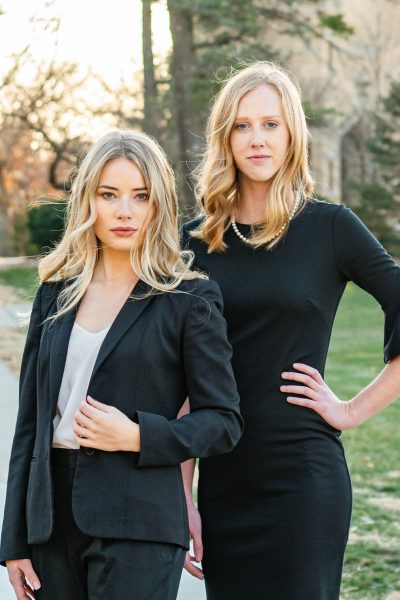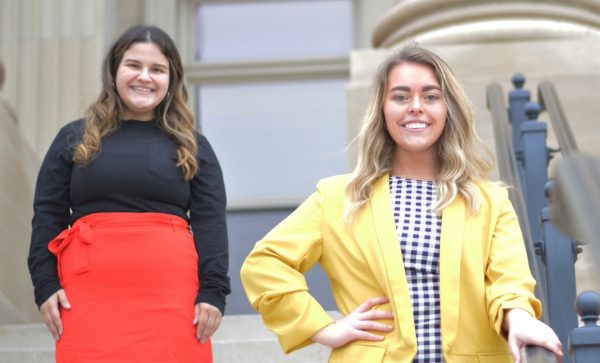Iowa State University Student Government’s president and vice president are only the second all-female executive pair since 1958, when student government adopted a three branch structure. Julia Campbell, a senior majoring in agricultural business and economics from DeWitt, Iowa, and Megan Decker, a junior majoring in agriculture and society from Rockwell City, Iowa, were elected in March 2021 and will serve a one-year term.
Also remarkable is that their election opponents last spring were an all-female team – Anna Olson, a junior in journalism & mass communication and political science from Boone, Iowa, and Mariana Gonzalez, a senior in political science and public relations from Eagle Grove, Iowa.

Campbell’s interest in serving in student government began in high school with extracurricular activities, including a year with the Miss Iowa scholarship program.
“That was interesting, to learn a lot of very specific ways in terms of projects and initiatives that you can have impact on large or broad topics,” Campbell said, “and I think that was a first taste of public service in that sense.”
Campbell continued her involvement in extracurricular activities at Iowa State. After running unsuccessfully for president of a student organization near the end of her sophomore year, she applied for a cabinet position in Student Government and was appointed director of affordability for the 2020-2021 academic year.
“I always had an interest in Student Government, to understand what was the input being included in the decisions that were being made, where were they pulling information from – who is providing this input, what was being provided,” she said.
Decker came to Iowa State with some political experience, having served as a legislative page in the Iowa Senate during the spring of her senior year in high school, and then as an intern in the governor’s office that summer.
Upon her arrival at Iowa State in the fall of 2020, Decker joined several campus organizations, including serving as a legislative ambassador for Student Government.
“I found myself in a wide variety of clubs that really allowed me to interact with different groups on campus that probably wouldn’t find themselves in the same room, which is really fascinating,” said Decker. “That is kind of what piqued my interest in Student Government initially, that on this really cool, diverse campus, we have an organization that’s representative of all that.”
As early as September 2020, Campbell and Decker were encouraged to run for executive office for the 2021-2022 academic year. Through their involvement in Student Government and the College of Agriculture and Life Sciences, they had begun a friendship that deepened as they explored the possibility of running for office.
Campbell said when considering whether to run, she reflected on the quote, “If not you, then who? If not now, then when?” She said, “Even if we didn’t feel maybe completely ready to take this next step, I think we were extremely well-prepared to adapt and learn and grow, because the things that we’d been involved in leading up to this helped prepare us to think critically and analyze situations as they come about and be assertive.”
Decker explained that knowing her “why” was important when she was deciding to run. She felt a sense of community at ISU and she wanted to make people feel heard and valued. “I knew this was a place that I felt that way at and I wanted the rest of the 30,000-plus students who go here to feel that way.”
Olson and Gonzalez also each identified their “why” when making the decision to run.

“After having the opportunity to serve as senior director of communications for Student Government, I was able to talk to many students about [mental health, financial burdens, discrimination and other such issues on campus] and even took action on some of those issues,” said Olson. “I wanted to continue to uplift and magnify student voices.”
Gonzalez said, “I felt like it was time to have representative officeholders. As a first-generation Latina, I knew diversity and inclusion, social justice issues, and safety were major concerns on our campus, and having first-hand knowledge about these areas, I was excited to be a leader for the student body. I also loved Student Government, since I had joined as a freshman senator and served as vice-speaker of the Senate. I had grown extremely close to the organization, and I wanted other students to love Iowa State as much as I do.”
Campbell and Decker said that the three-week campaign before the election went by in a blur of five to six days a week of keeping up with their classes while meeting with as many students as possible. Campbell said, “The more conversations we had, the more we realized how much there was to learn.”
Decker said that the campaign was a time of personal growth that challenged them in many ways. “[We had] to think a little bit deeper, to work a little bit harder and dig a little bit deeper in times when we didn’t think we could.” However, they felt empowered by the experience and came away saying, “We can do anything.”
The Olson-Gonzalez ticket also learned and grew from their campaign experience.
“I learned so much about the world of politics and the campus community,” said Olson, “including how much blood, sweat and energy drinks it takes to communicate with 99+ clubs on campus and numerous administrators to raise awareness and educate ourselves about campus initiatives and what is important to students.”
Gonzalez reflected on her interactions with others saying, “I learned how much passion I had for listening to others’ experiences and searching for solutions. I had been criticized for being emotional throughout the campaign, but I honestly believe my vulnerability helped me connect to other students in a significant way.” She said that listening to students from across campus share what mattered to them was empowering and eye-opening, and it showed her that students really do care about their campus. She added, “I am definitely interested in running for public office when I am older, so this was a great experience to get a real understanding of similar responsibilities.”
One question that many candidates hear is, “What happens if you lose?” For all four women, the journey was valuable, regardless of outcome.
“I think at one point we replied, well we’re not running simply just to win, so we shouldn’t not run just because we’re afraid of losing.,” said Campbell. “It’s what’s impact we can have on the Iowa State community and how can we most positively represent Iowa State in the eyes of the state legislature and the Board of Regents to really voice student concerns and bring together both sides of the table.” She added that they were focused on running their campaign with integrity, compassion and kindness.
Olson said, “I learned that no matter the outcome of your campaign it is always important to stick to your morals. Knowing that students on campus recognized and supported our strong campaign to make Student Government and campus a more welcoming and inclusive university, indicates that our campaign did make an impact.” She added that the most important thing she learned is to enjoy the ride. “Being a woman in leadership feels like a constant race on what you can do next, when in reality it is a marathon that can’t be won unless you enjoy the run.”
“Although the results were not exactly what we had hoped for in the end, I was able to reflect on the work we had done and was proud of the dialogue we had started,” said Gonzalez.
What advice would these candidates share with others considering running for office in Student Government?
“People will remember how you treat them. They may forget what you said or what happened or even who won, but how you treat them matters,” Decker said.
“My advice is to stick to your convictions and principles, work hard, but also continue to learn and grow from those around you,” said Olson. “Allow room for different voices – even those that challenge us to look deep within ourselves and our organization as a whole. No matter the final outcome, be sure that you put all your effort into your campaign and follow your moral compass.”
The women all also encourage students to be involved. “Regardless of your knowledge about the political process or campus initiatives, it is so important to have individuals with unique perspectives and experiences represented as it adds greater depth and knowledge to the organization as a whole and ensures that all voices are heard and represented,” Olson said.
Gonzalez said she joined student government as a freshman to improve campus climate, and she’s seen improvement. Due in part to her involvement with Student Government, Gonzalez now serves on the 2021-2022 Senior Vice President for Student Affairs Student Advisory Board. “For anyone even remotely interested in Student Government, I would wish them all of these opportunities, experiences and more!”
As Campbell and Decker began their term, they considered how they would listen different groups and do what they think is best for campus as a whole.
“One thing that is so critically important in any environment is establishing trust and personal relationships,” said Campbell.
“One thing we talked about during the campaign that I hope reflects into this year is that we’re not just working for one side,” Decker said. “We really are supposed to represent every single student whether we agree with that particular decision or not. That’s a hard thing that I don’t think we’re going to be perfect on – and no one is.”
Both Campbell and Decker credit strong women role models in their lives with empowering them to pursue leadership in Student Government. Seeing women in leadership positions at Iowa State and in state government has also inspired them.
Iowa State Student Government has had only 16 women serve as president and 18 as vice president in its 63-year history. Campbell and Decker’s term is only the second time both offices were held by women. The first were Emily Jensen and Sara Faber, who served the 2006-2007 academic year. The 2021 election was the first time women made up all four candidates for executive office.
Student government elections are held in March of each year, with informative sessions held in February. More information is available from the Iowa State Student Government Election Commission.